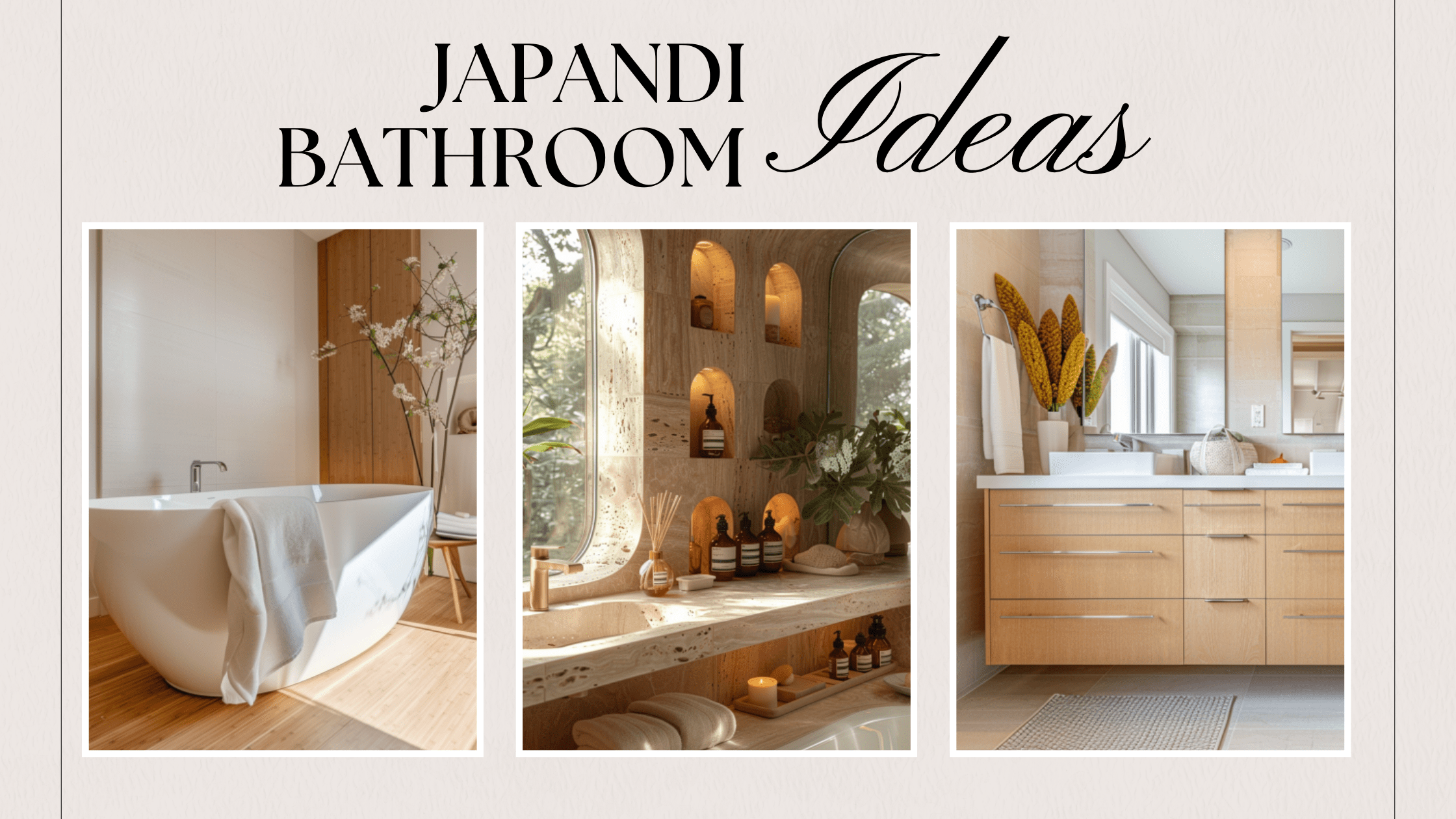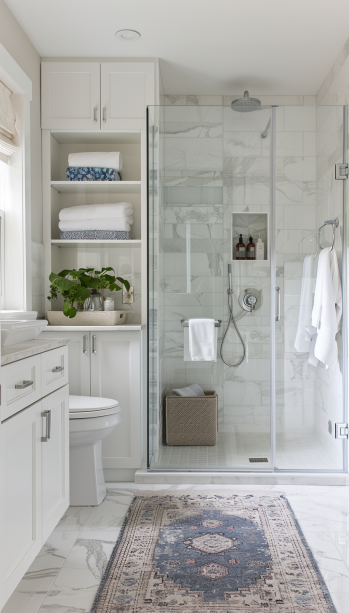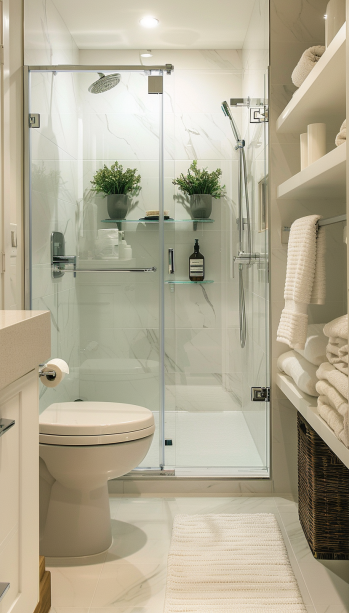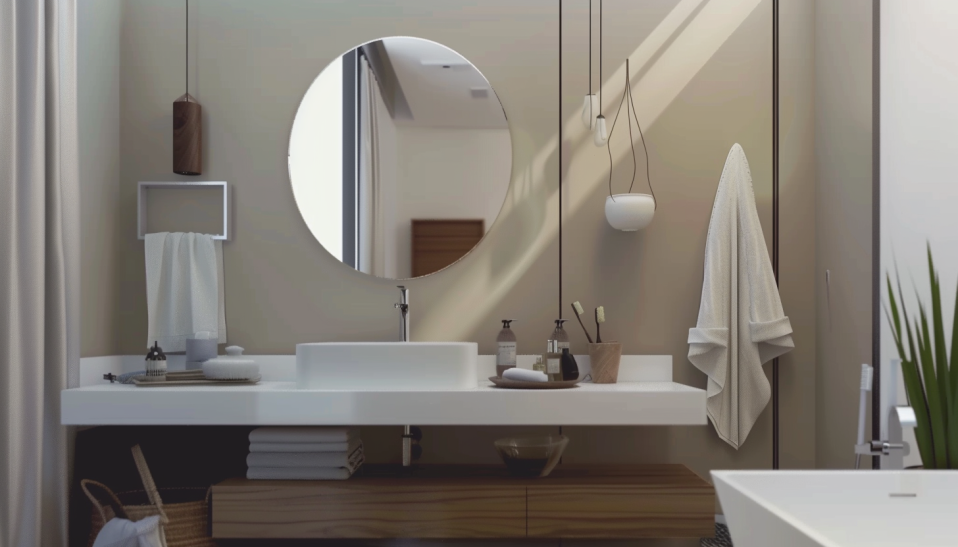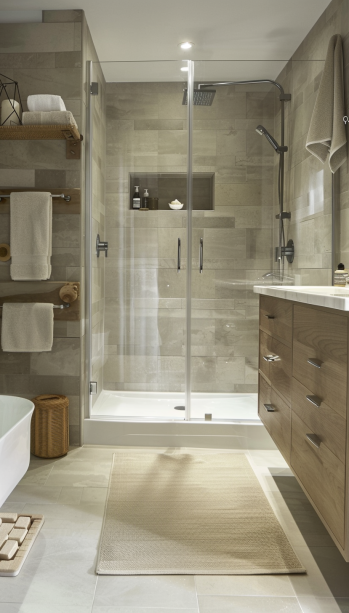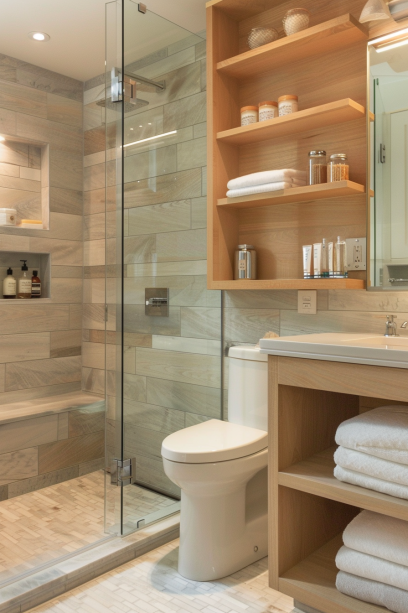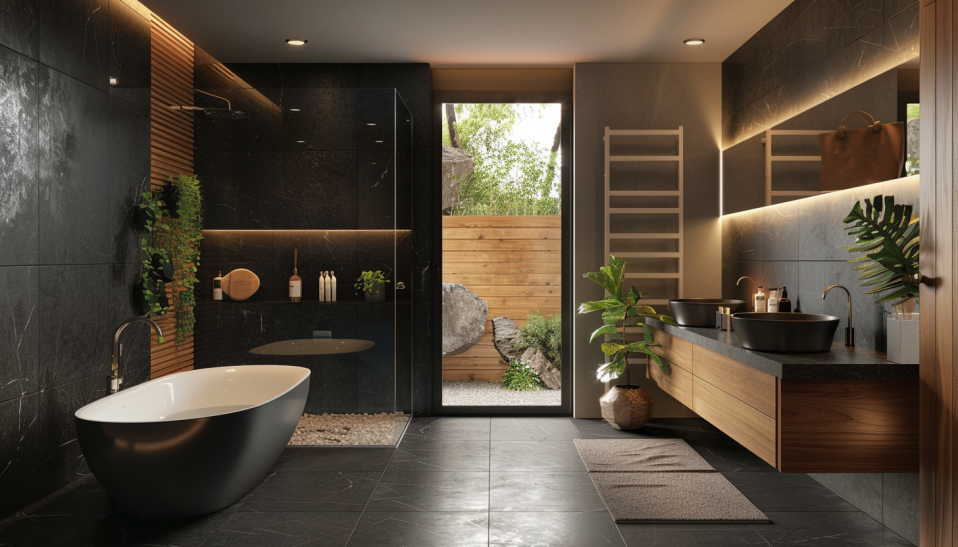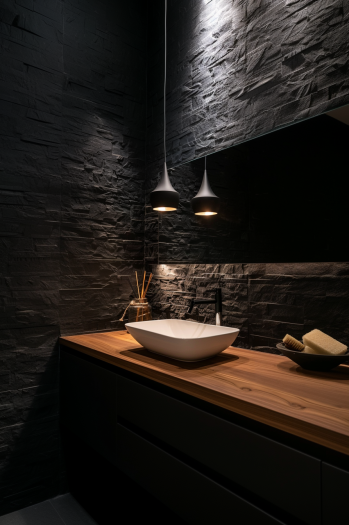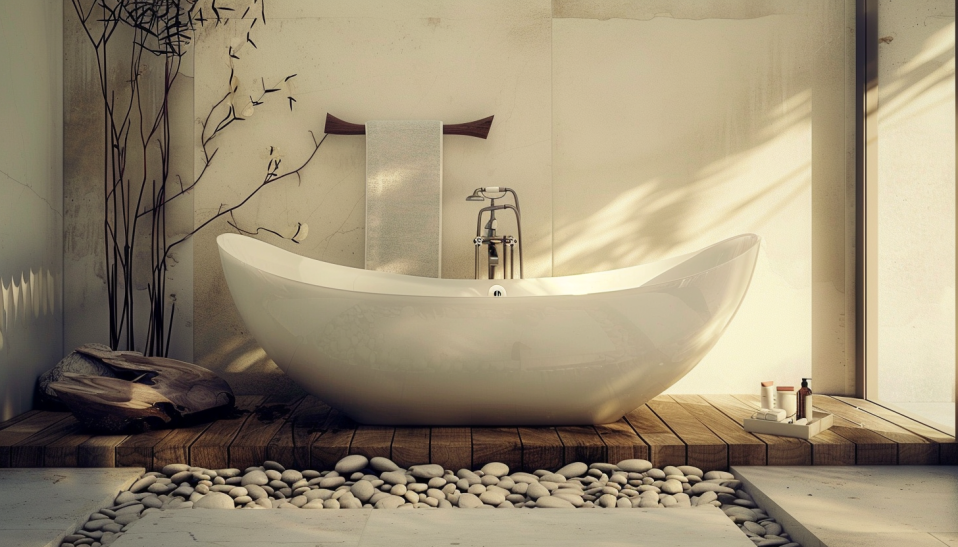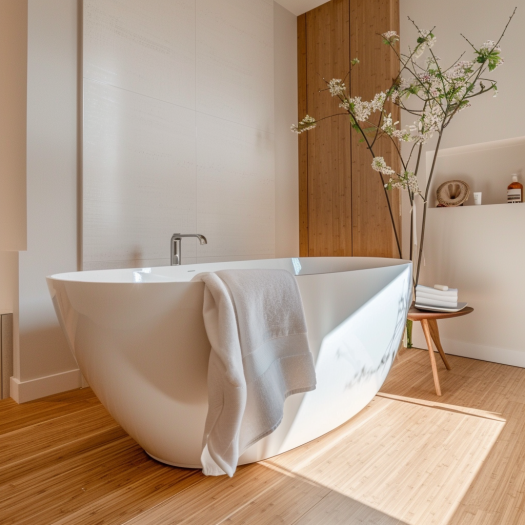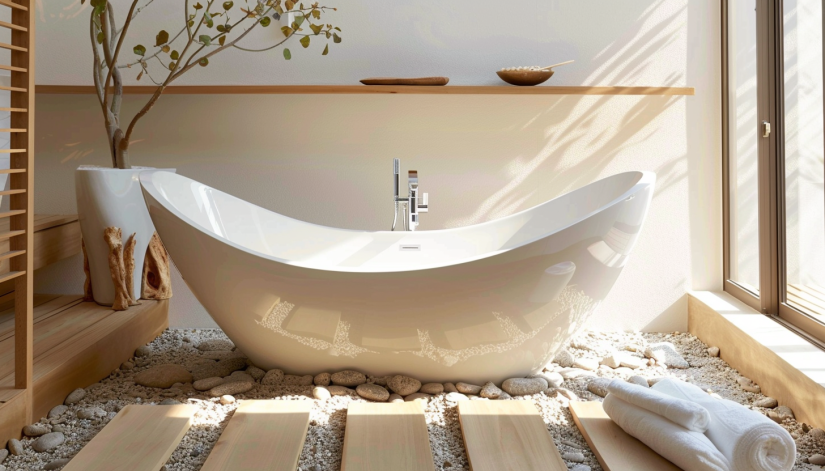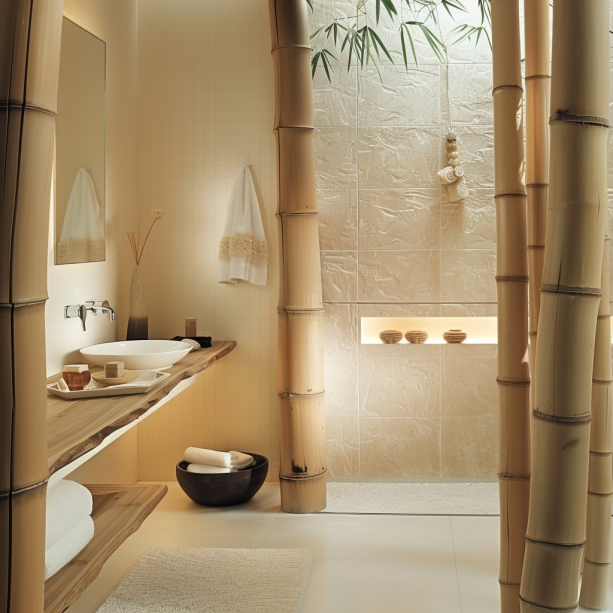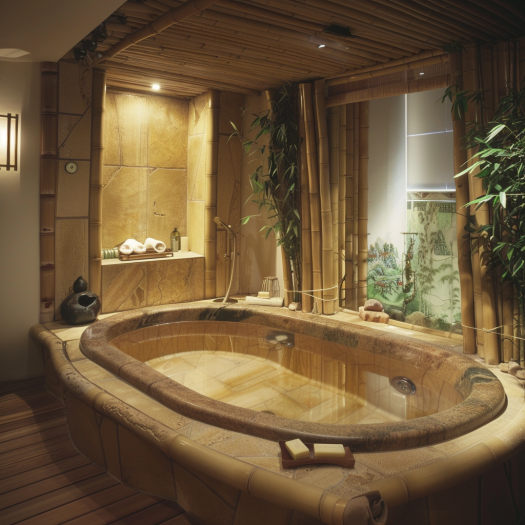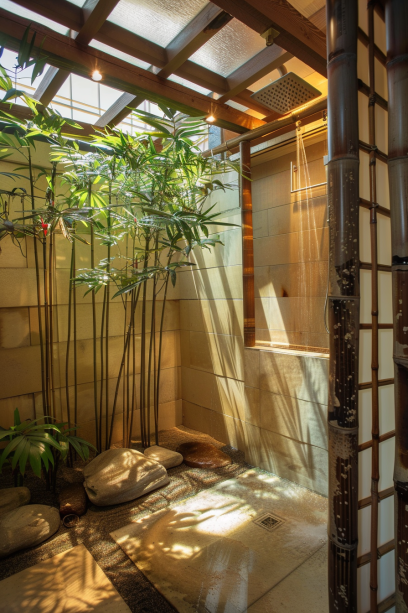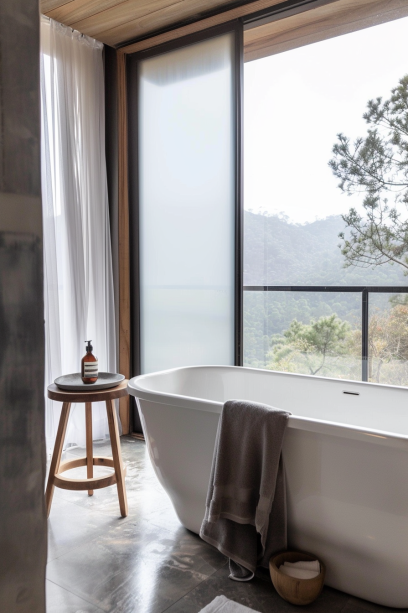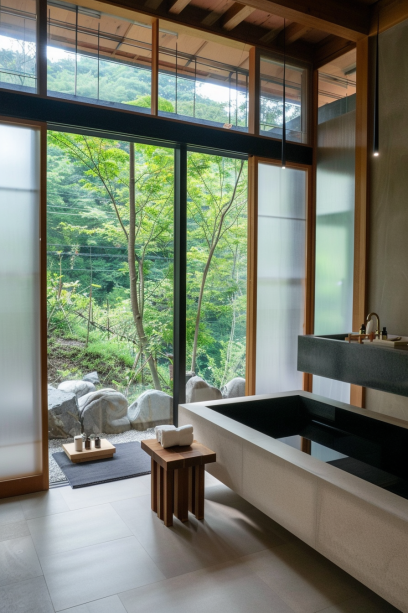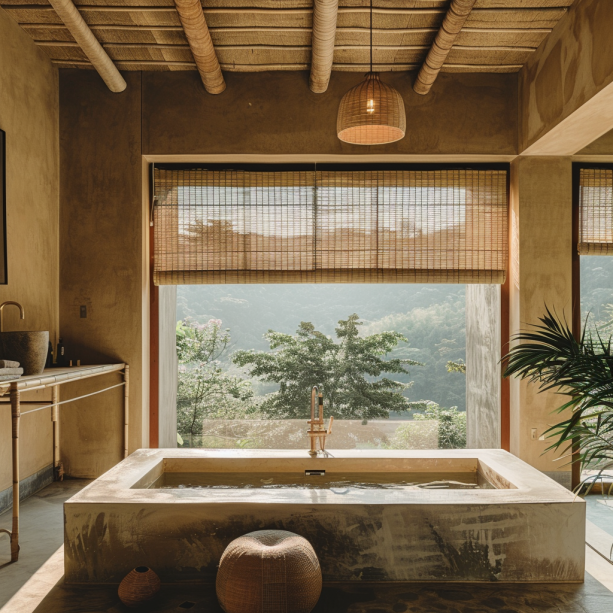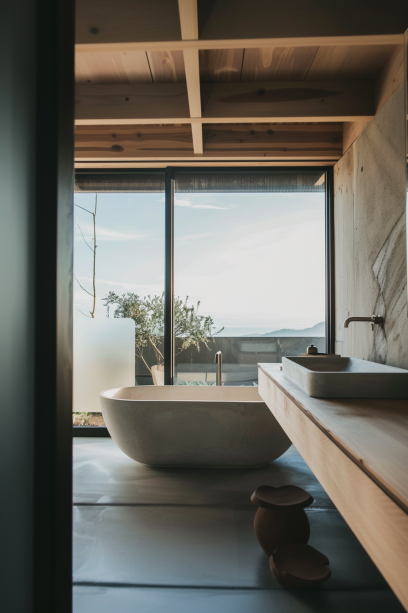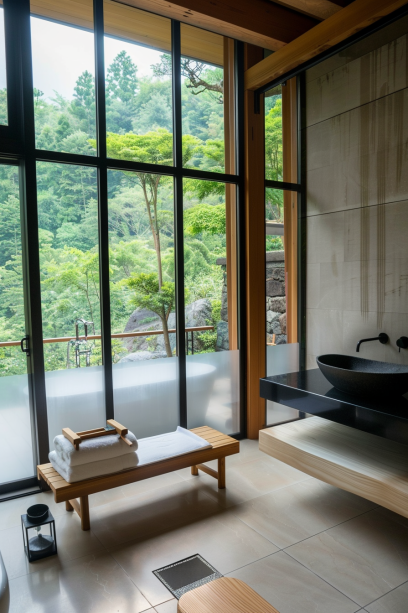The Japandi style – a hybrid of Japanese and Scandinavian home decor – emphasises simple, natural materials, neutral colours and a calm overall ambiance, making it an ideal approach for creating a bathroom as a place for relaxation and rejuvenation in a bustling world.
Below, we present 14+ Japandi bathroom ideas that draw from the best of Japan and Scandinavia for various colour schemes.
1. The Minimalist White Japandi Bathroom
Minimalism underpins the Japandi philosophy, and white accents this clean, airy vibe.
For a white Japandi bathroom, look no further than:
Clutter-free surfaces: Keep countertops clean and store personal items out of sight.
Natural light: By using sheer, light draperies, you can make the most of natural light which works well with the white palette.
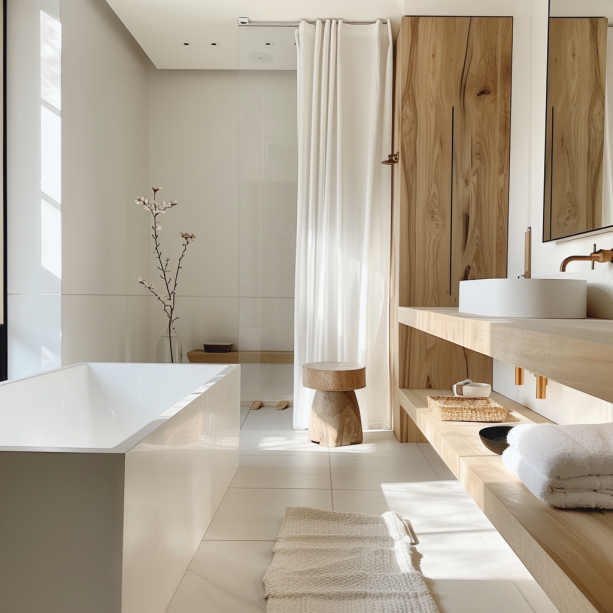
Wood accents: Add warmth with pale wood furniture and shelving.
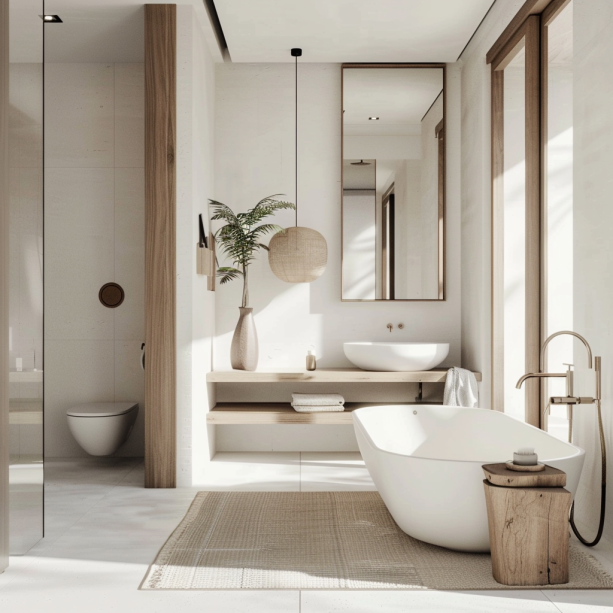
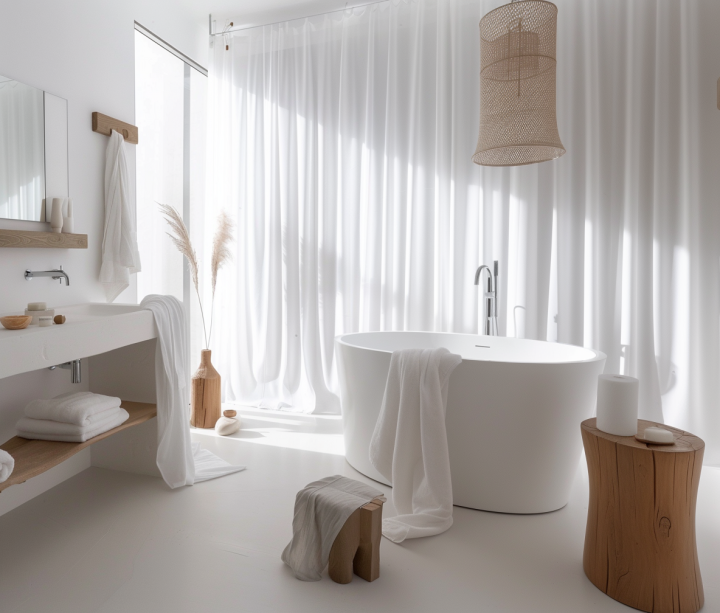
2. Space-Saving Japandi Small Bathroom Ideas
In smaller bathrooms, Japandi’s functional simplicity becomes particularly advantageous:
Floating Vanities: No legs, which means more floor space to give the appearance of a bigger room.
Mirrors: A large, round mirror can make the space feel more expansive.
Neutral palette: Stay with off-whites, soft grays and warm-toned woods to keep it from feeling closed in.
3. Incorporating Earthy Grey Tones
Grey works perfectly with Japandi bathrooms, as it complements the warmth of the wood with the coolness of stone.
Materials: Combine different textures like a stone grey basin with a wooden vanity.
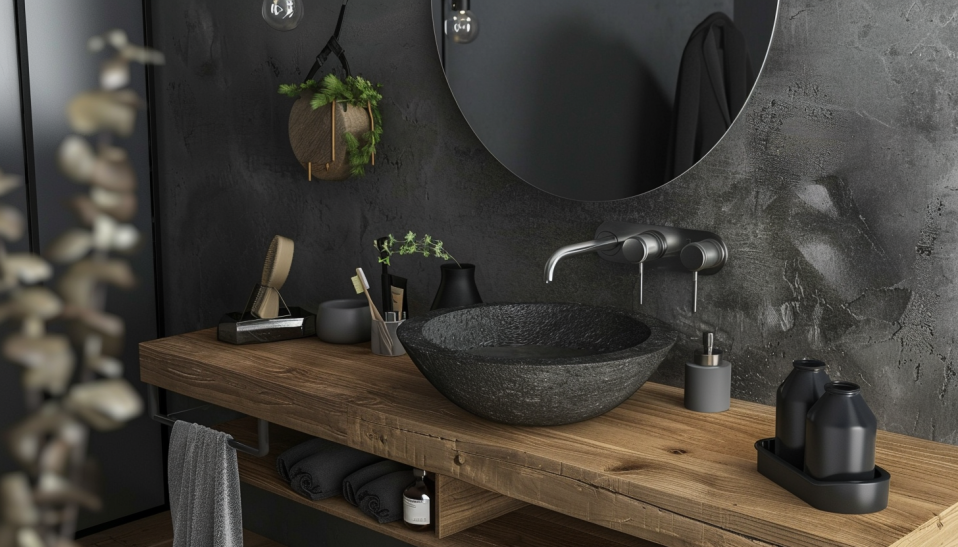
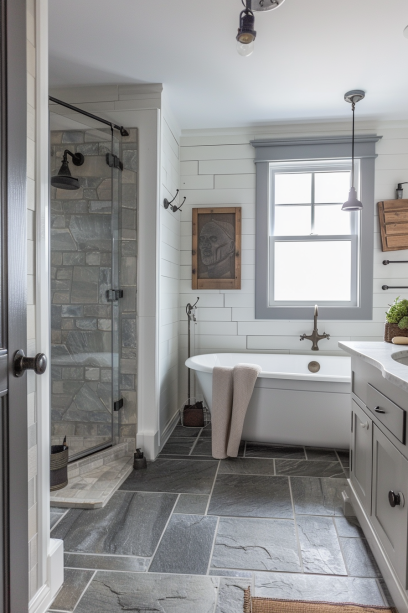
Harmonize: Ensure all greys are of the same undertone to avoid a mismatched appearance.
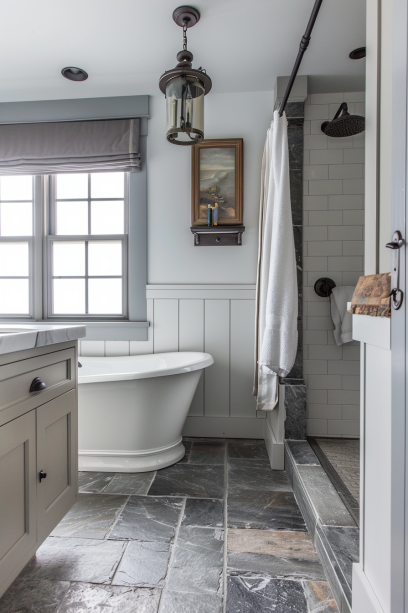
Accent features: Utilize black or deep brown elements as accents to add depth.
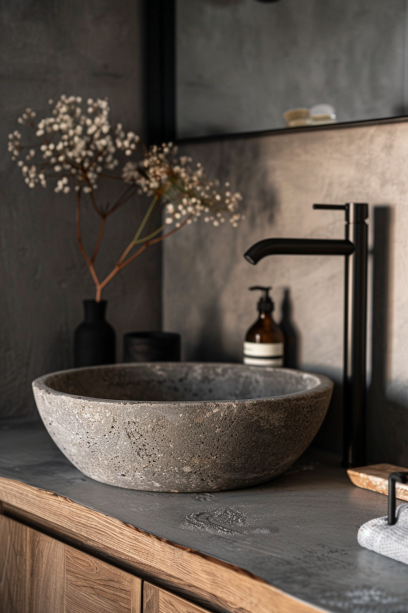
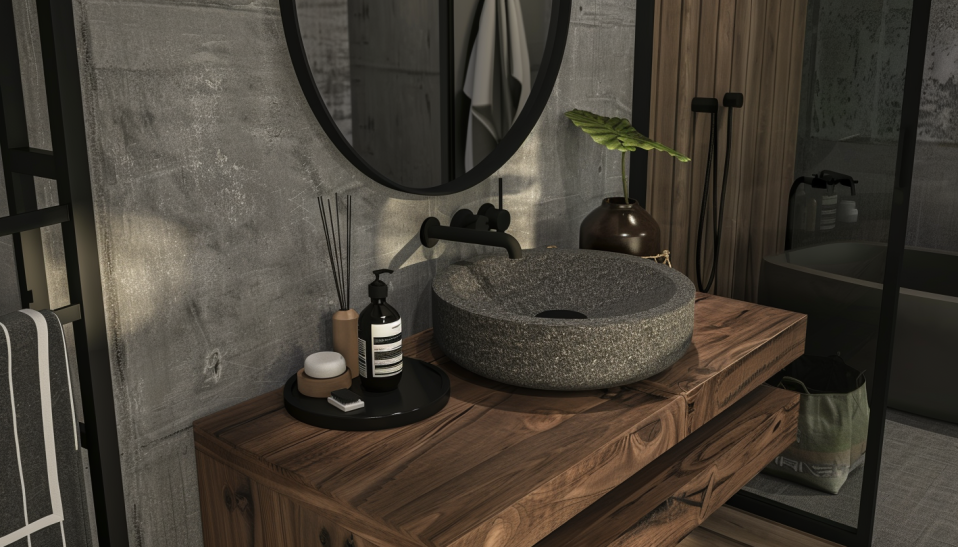
4. Bold Black Japandi Bathroom Ideas
A bathroom in Japandi style could be enhanced with black, to give a decidedly Nordic, dramatic vibe while still feeling calm and inviting.
Contrast: Balance black with plenty of white and wooden tones.
Texture: Pair matte black tiles with rough natural stone and smooth wood grains.
Lighting: Ensure ample lighting to keep the space from feeling too dark.
5. Japandi Bathroom with Bathtub Centerpiece
Focus on a minimalist bathtub, usable as a relaxing focal point:
Freestanding tub: Choose a simple, sculptural tub to serve as the centerpiece.
Natural elements: Surround the tub with natural elements like pebbles or wood planks.
Simplicity: Keep decorations simple to allow the tub to be the focal point.
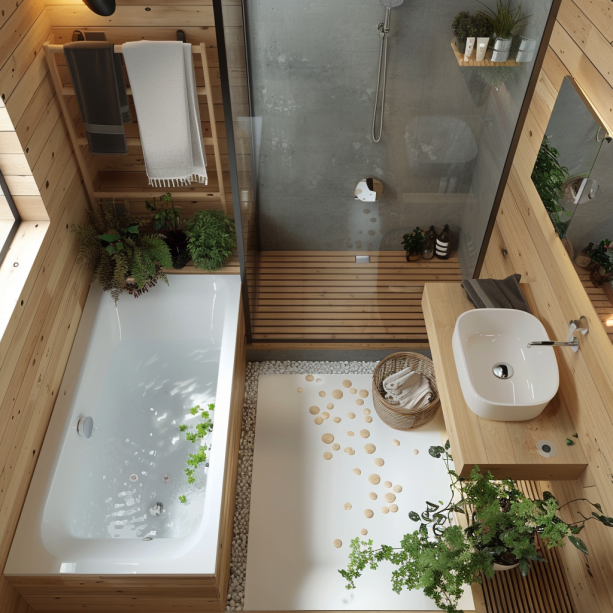
6. Japandi Interior Bathroom Zen Garden
Create a Zen corner to emphasize tranquility:
Live plants: Bamboo, ferns, and moss can thrive in bathroom conditions.
Stone elements: Add a small rock garden or a fountain.
Natural light: Utilize skylights or frosted windows to diffuse natural light softly.
7. Japandi Style Peppled Floor
Incorporate a pebbled floor for a tactile, natural sensation beneath the feet:
Textures: Combine the pebbled floor with smooth wooden elements or sleek tiles.
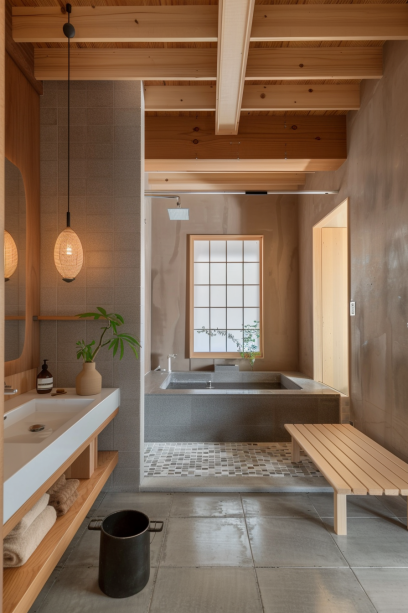
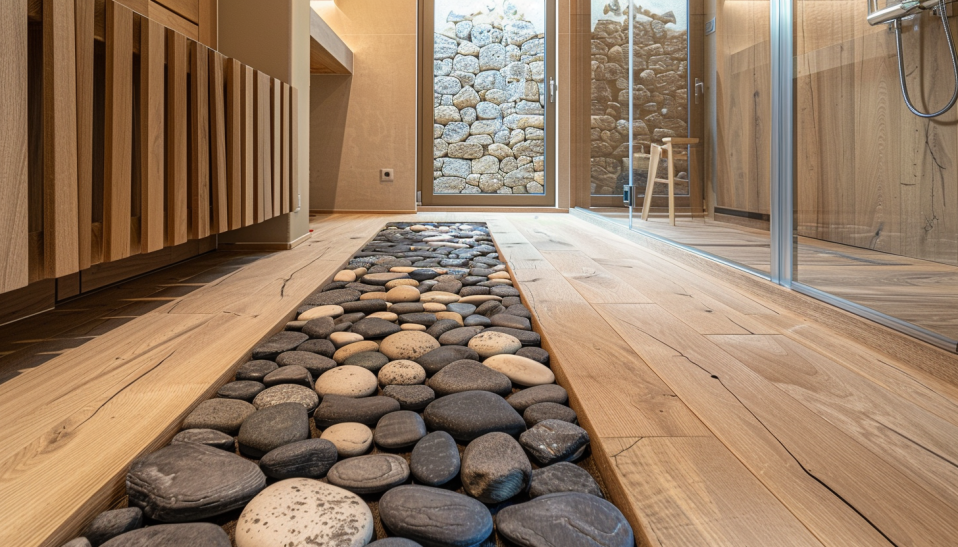
Design: Arrange pebbles in a gradient or detailing specific areas for artistic flair.
Functionality: Ensure the floor is well-sealed and treated for moisture resistance.
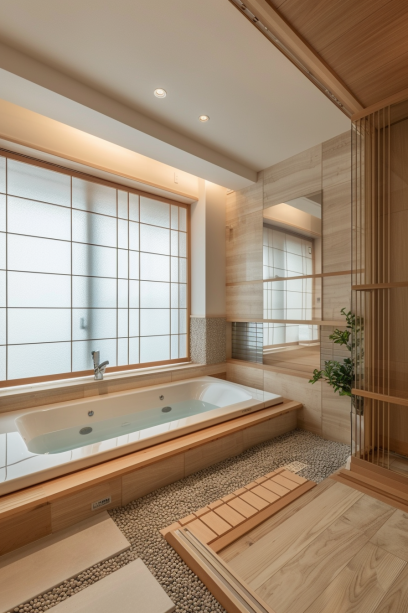
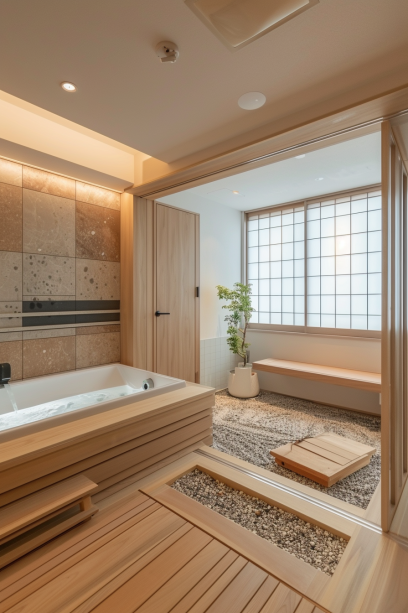
8. Wooden Details in Japandi Bathroom
Wood plays a vital role in warming up the typically cool Japandi color palettes:
Variety: Use different wood varieties and stains to add interest.
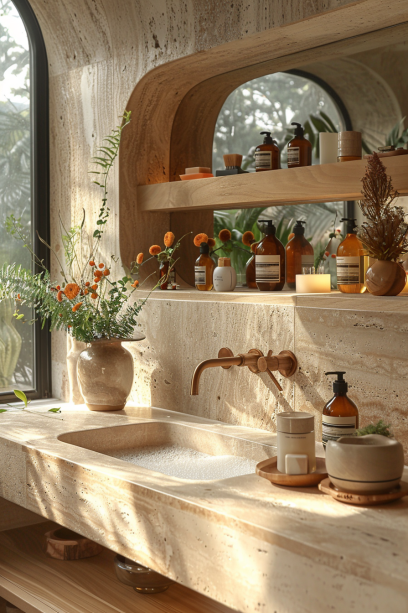
Treatment: Ensure all wood is well sealed to prevent water damage.
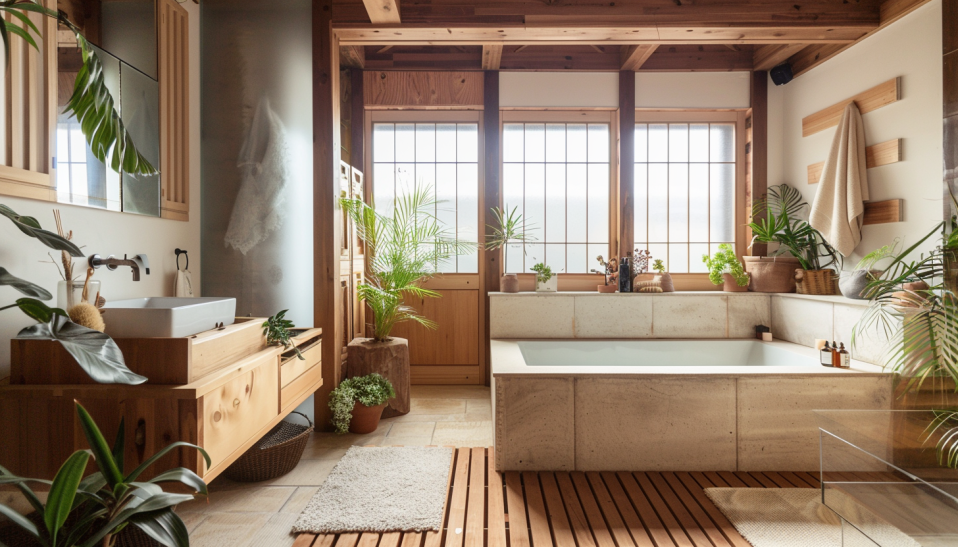
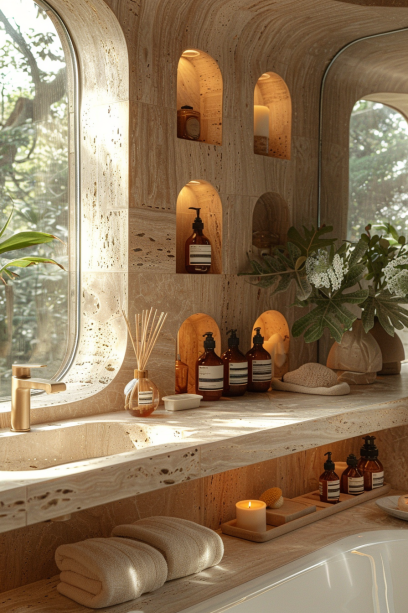
Sustainability: Opt for reclaimed or sustainably sourced wood.
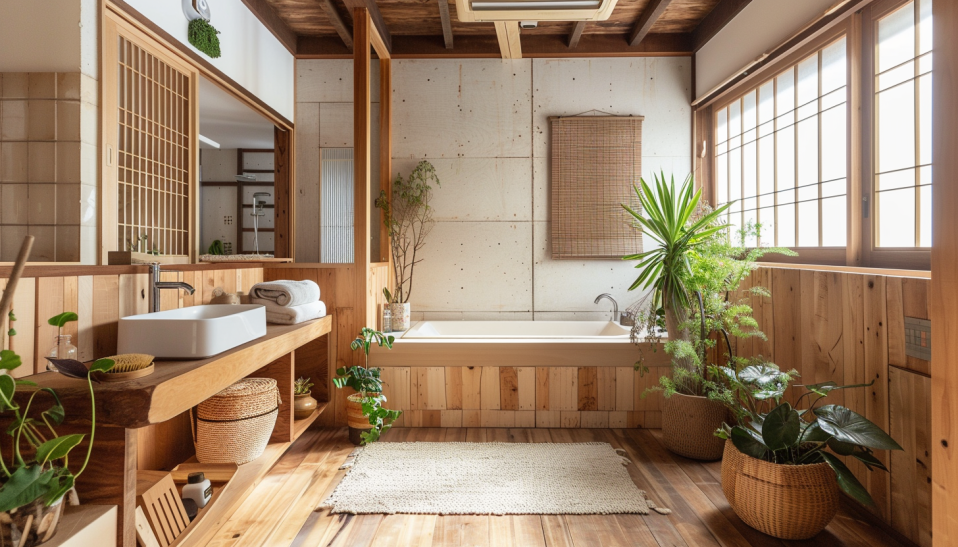
9. Japandi Bathroom with a View
If you are blessed with a view worth looking at from the outside, incorporate it into your design:
Windows: Floor-to-ceiling windows are perfect for such setups.
Privacy: Consider frosted or smart glass for privacy.
Outdoor elements: Reflect the outdoor scenery inside with matching color and texture tones.
10. Monochrome with Textural Depth
Even a strict monochrome palette in a Japandi bathroom can be visually engaging:
Variation in textures: Mix glossy tiles with matte finishes and rough textiles.
Layering: Use different shades of the same color to create visual depth.
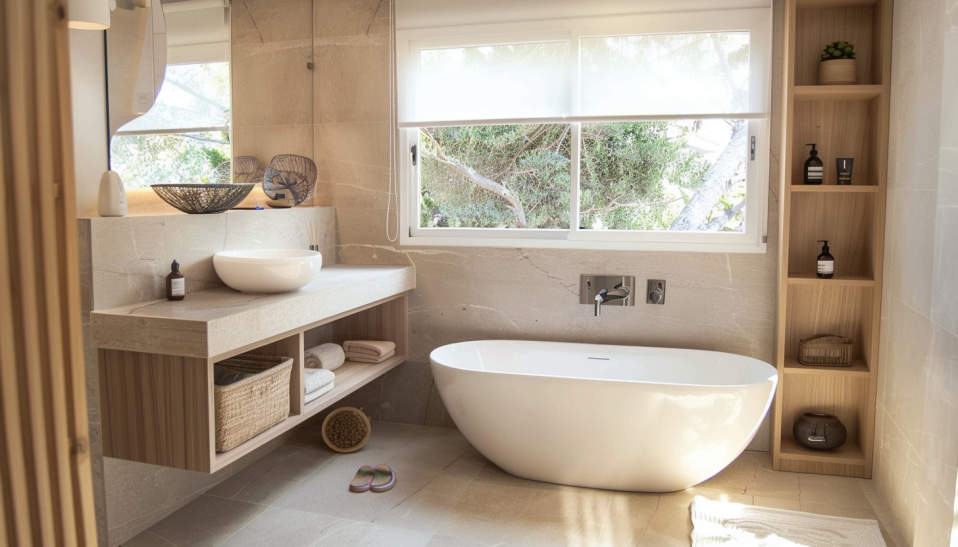
Accent pieces: A few well-chosen accessories can enhance the monochrome theme without clutter.
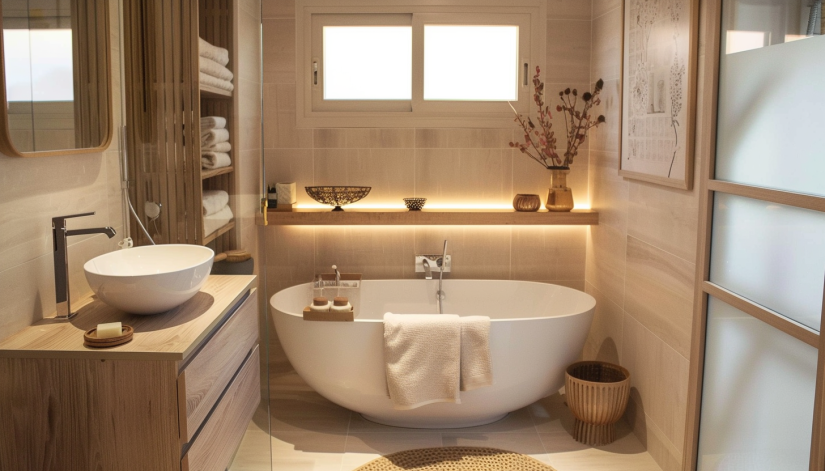
Understanding Japandi Aesthetics:
Japandi is a fusion of the two aesthetics: Japanese for its cool, minimalist lines, and Scandinavian for its snug, utilitarian elements.
It is a union of simplicity and comfort, the best of both worlds.

At the core of Japandi design are natural materials, such as wood, bamboo and linen, which help to foster a calm, earthy ambience.
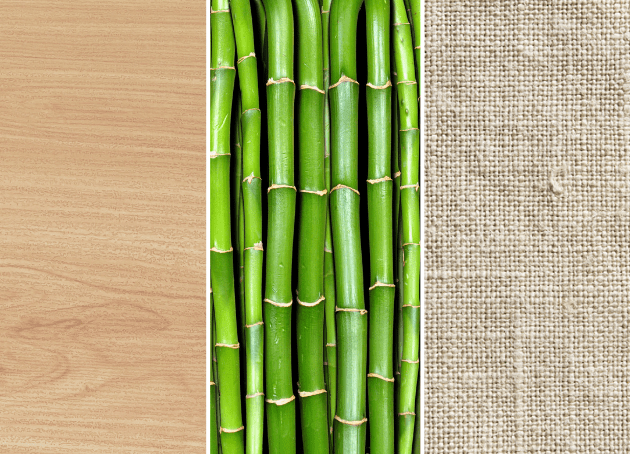
Soothing colour schemes, which include whites, greys and soft pastels, are part of the equation too, while the commitment to stripped-back simplicity and the incorporation of uncluttered areas help to foster an open, clutter-free lifestyle.
By adopting such design practices, not only do you enhance the aesthetic of your home but you also make your space more liveable, more sustainable.
Japandi Bathroom Ideas for Small Spaces
Since it adds a sense of serenity and relaxation to a limited space, Japandi is a perfect design philosophy to use in a small bathroom.
Here are some helpful tips for how to maximise space in a small bathroom without having to sacrifice Japandi style.
Utilize Floating Vanities and Fixtures
Japandi bathrooms often include a floating vanity.
Apart from being a practical storage solution, a floating vanity helps make the bathroom look more spacious because it raises the storage and other fixtures off the floor, which creates an optical illusion of an expanded floor area, giving the room the impression of having greater volume.
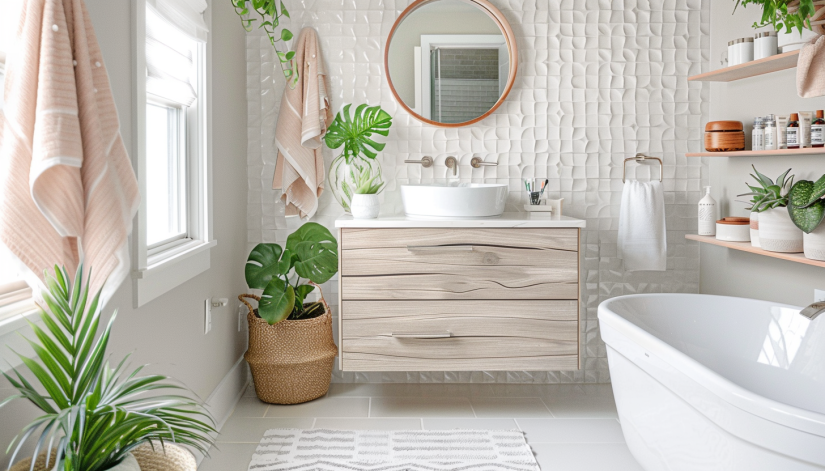
The design of the vanity should be simple and clean, to keep with the minimalist ethos of Japandi.
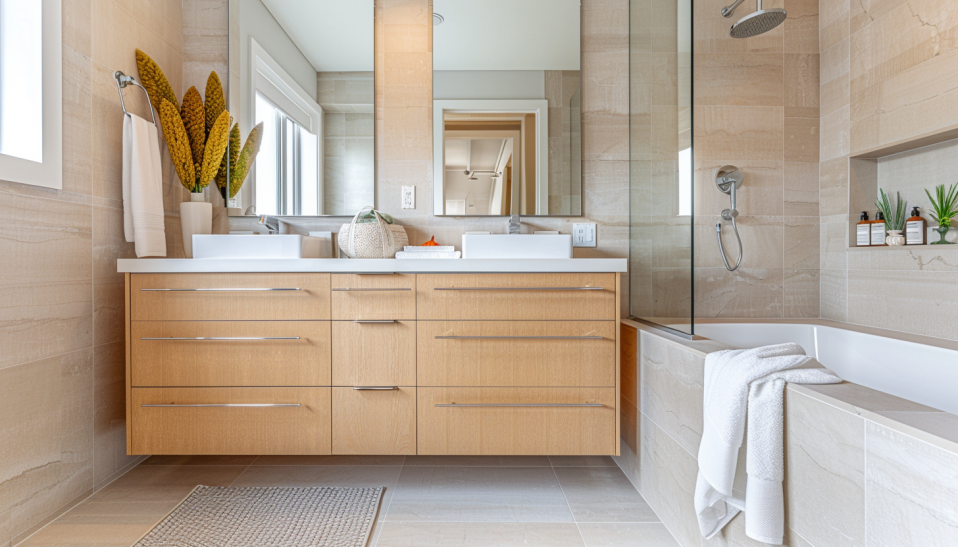
Opt for Clear Glass Shower Doors
Inside a small Japandi bathroom, clear glass shower doors are ideal, as they enable uninterrupted access to the visual space of the entire bathroom.
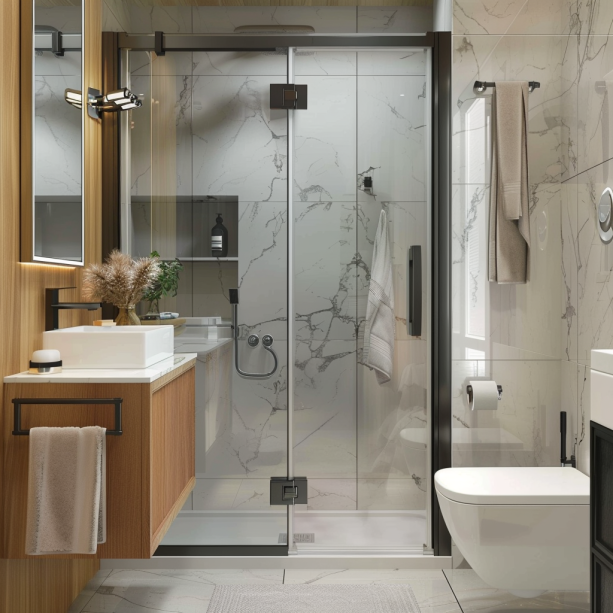
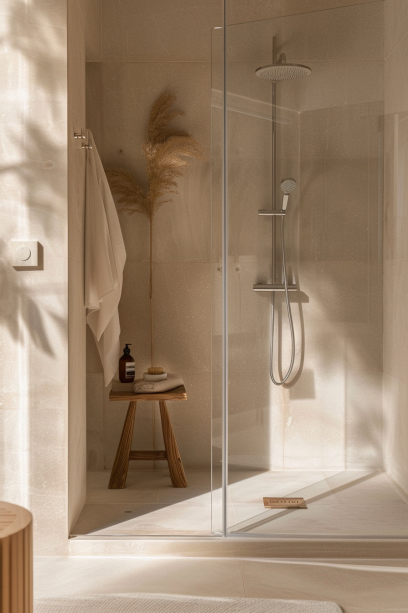
Opt for frameless shower doors so that the overall aesthetic remains light and airy.
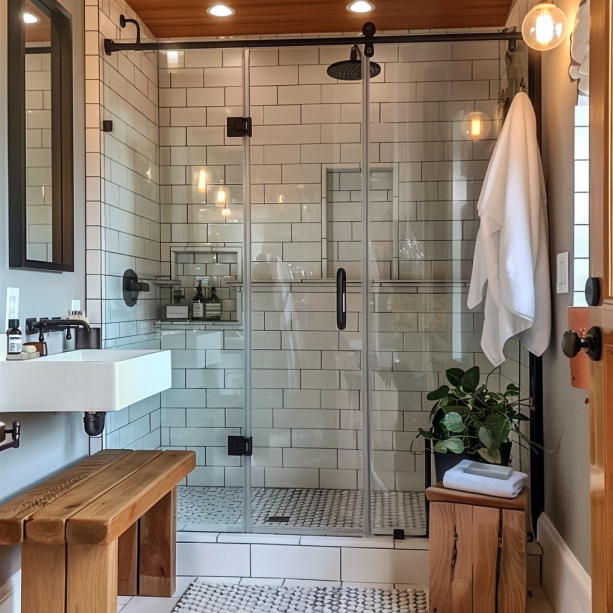
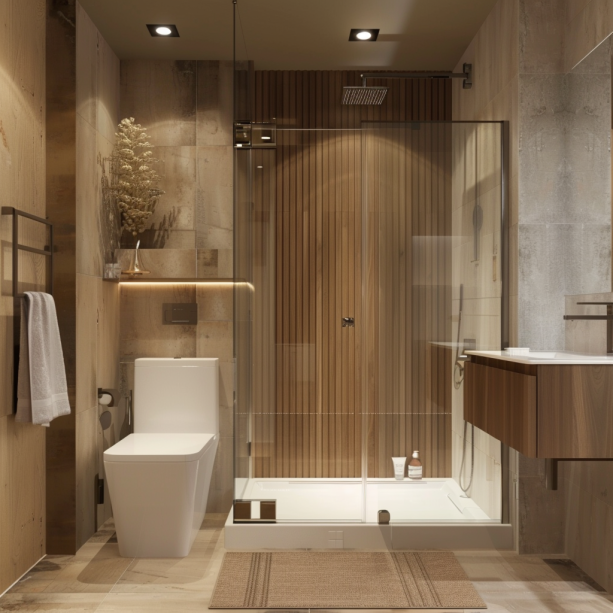
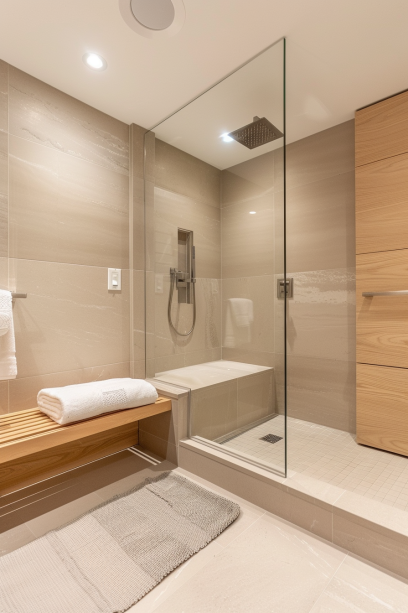
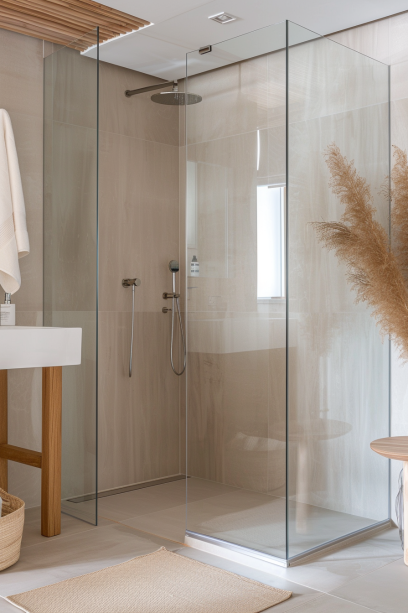
Select Light Wooden Tones
One of the hallmarks of a Japandi interior is the use of a neutral colour palette.
Shades that promote feelings of calm and cleanliness tend to be favoured.
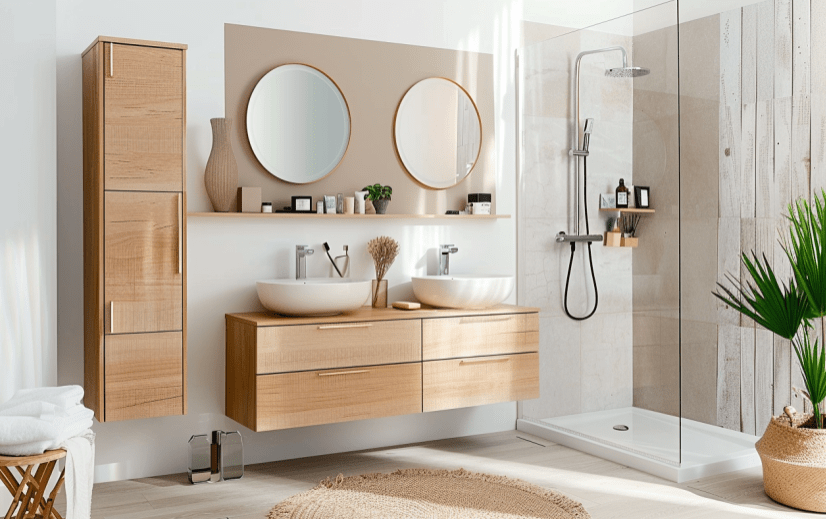
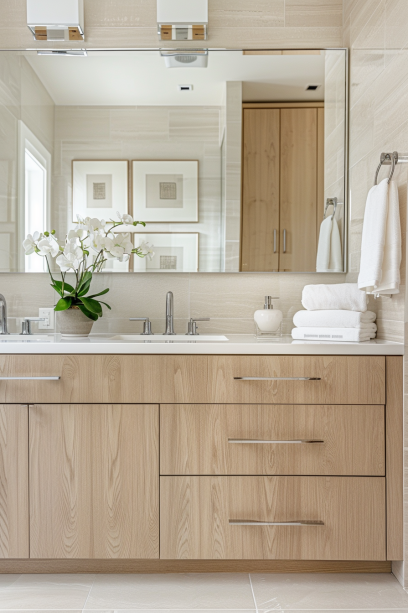
This can be particularly useful for small bathrooms, where light wooden tones can help to make it feel bigger and more welcoming.
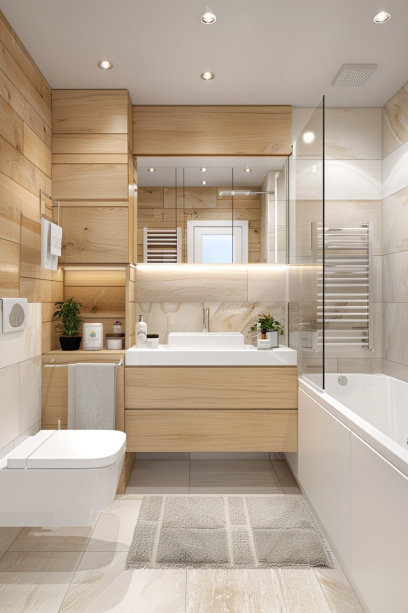
Lighter woods such as ash, beech or light oak will reflect light around the space, and these tones also bring warmth and texture that is characteristic of nature, which is essential for the health-giving environment that Japandi is trying to create.
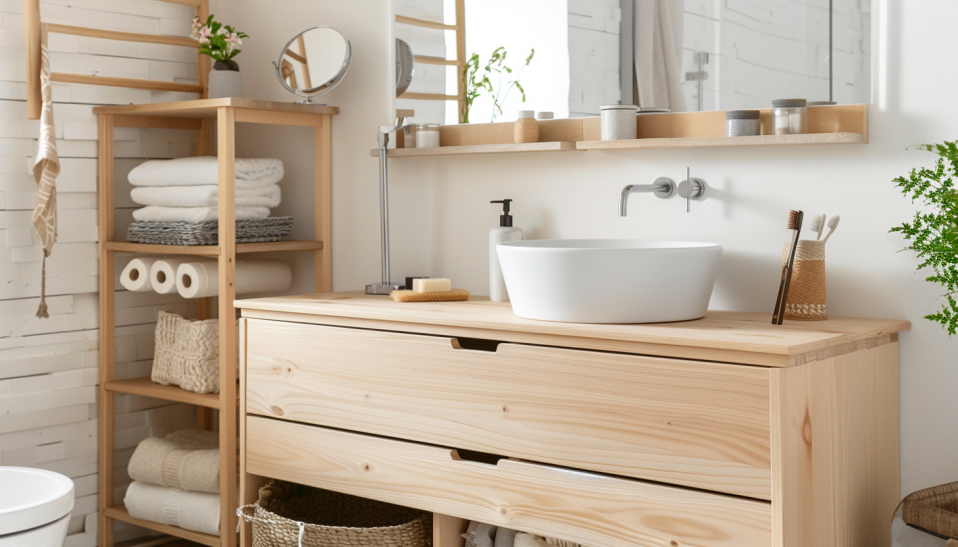
Incorporate Minimalistic Fixtures
In the same minimalist spirit, Japandi fixtures should be simple, non-intrusive and help maintain a clean line for the design.
Select taps and shower heads that have a matte finish (black or copper might work well), keeping it simple and understated – and let the design do the talking.
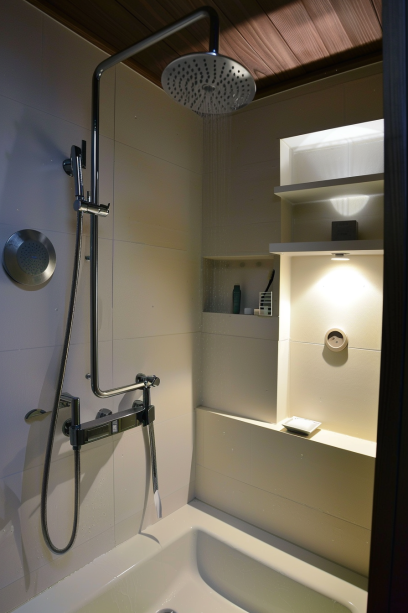
The small scale of the space is flattered by the simplicity of the fit-out.
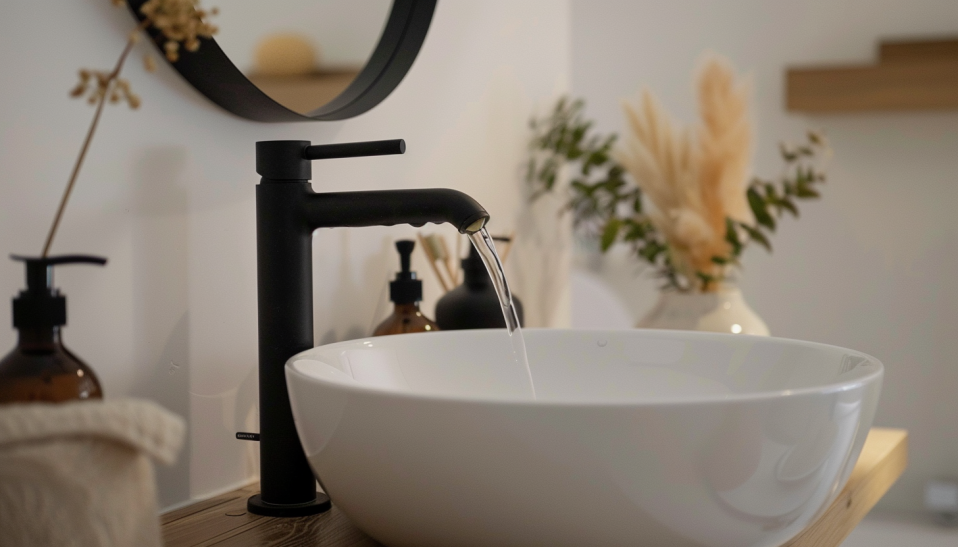
Enhance the Sense of Space
To create the illusion of space, use large mirrors.
Not only can a big mirror be functional, it reflects light and views, doubling the visual area of some part of the room.
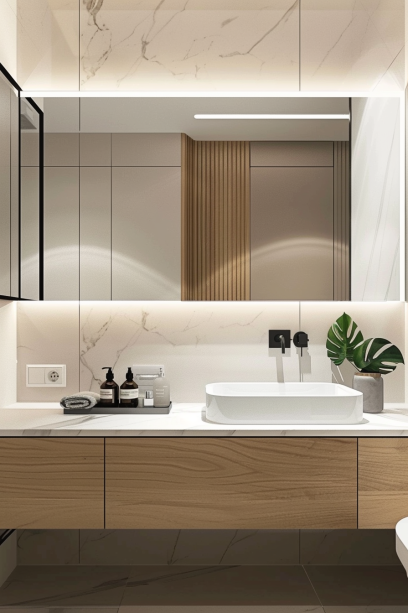
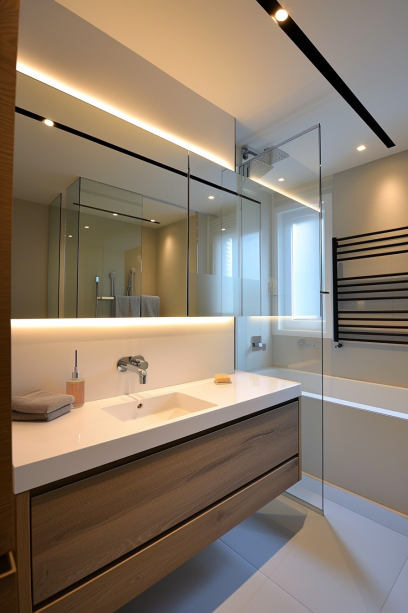
Hidden cabinets behind mirrors or in false walls can store your essentials without encroaching on your core space.
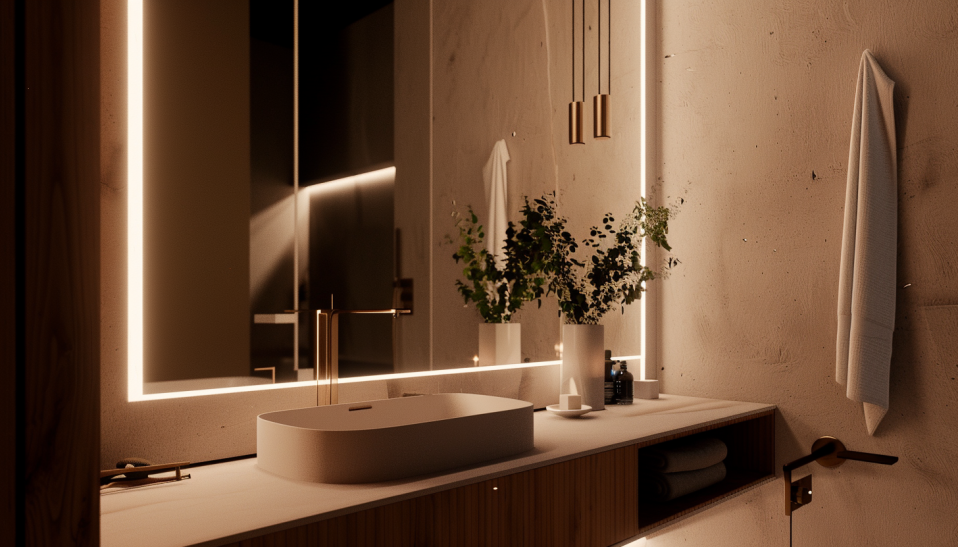
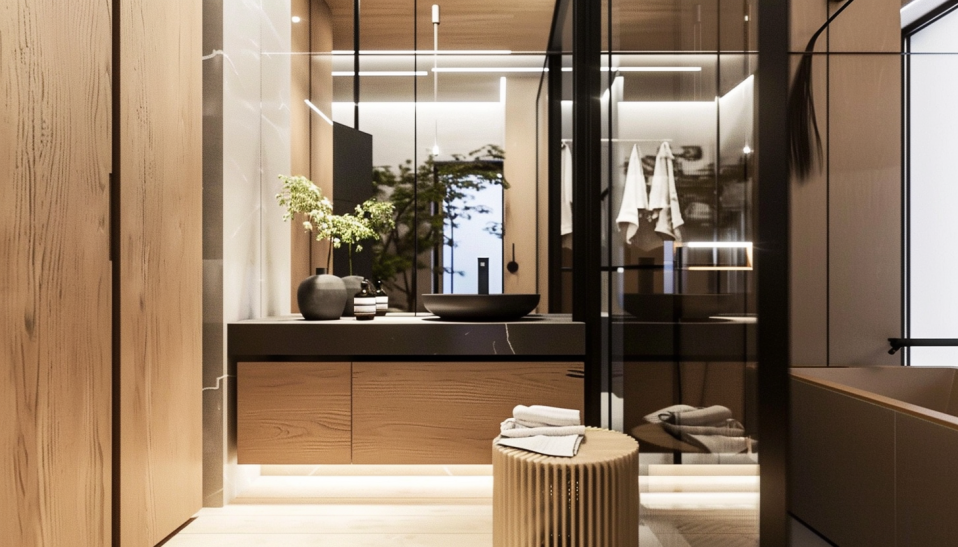
So What is Japandi?
Japandi Style: Blending Cultures in Home Decor
- Origin: Japandi is a hybrid design style combining Scandinavian functionality and Japanese minimalism.
- Core Principles: This style focuses on simplicity, functionality, respect for nature, and craftsmanship.
- Appeal: It combines Nordic hygge (comfort and cosiness) with Buddhist wabi-sabi (beauty of things imperfect or impermanent).
Japandi Color Palette
The Japandi colour palette is a thoughtful combination of Scandi lightness and Japanese wholesome, earthy tones.
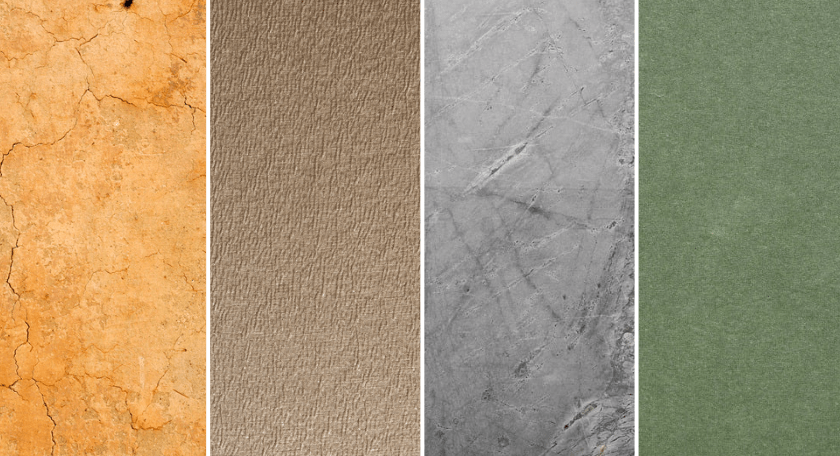
Tips to bounce off:
- Neutral Base: Utilize a base of neutral tones, using 3-4 colors predominantly.
- Black Accents: Use black sparingly – like a stroke of ink in a minimalist Japanese painting.
- Colours: Balance whites and pastels for a Scandinavian feel, darker, earthier shades for a Japanese one. Both are best avoided in favour of calmer, more quieting hues such as ochres, taupes, greys and greens.

Wall Designs in Japandi Interiors
Wall treatments play a crucial role in defining the Japandi style:
- Colour: Keep it warm white to add a Scandinavian touch, or go natural, dark and earthy for Japanese.
- Texture: Lime-washed walls, wooden slats, even subtle concrete textures bring interest.
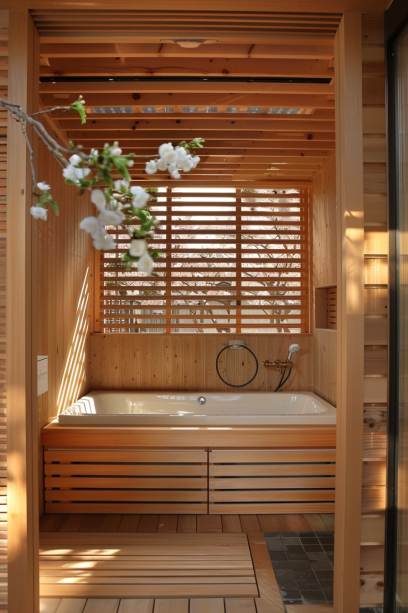
How to Integrate Wood:
Wood is essential in Japandi decor, bridging both design worlds:
- Types of wood: Scandinavian styles generally use lighter woods, while Japanese styles prefer darker shades. How about mixing them up to achieve a satisfying contrast?
- Limit Varieties: Stick to a maximum of three types of wood to maintain cohesion.
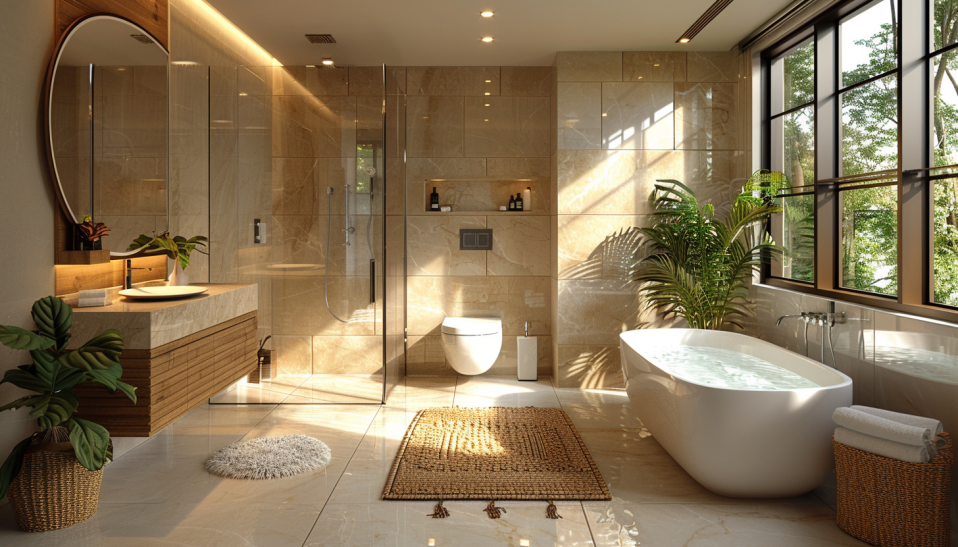
Furniture and Furnishings
Choosing the right furniture is vital for achieving the Japandi look:
- Low-profile Furniture: Keep your furniture close to the ground to create a sense of grounding.
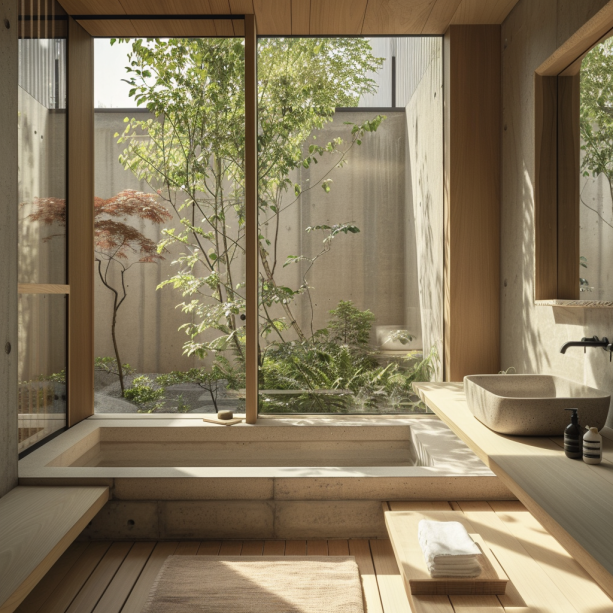
- Simple Designs: Select pieces with clean lines and minimal embellishment.
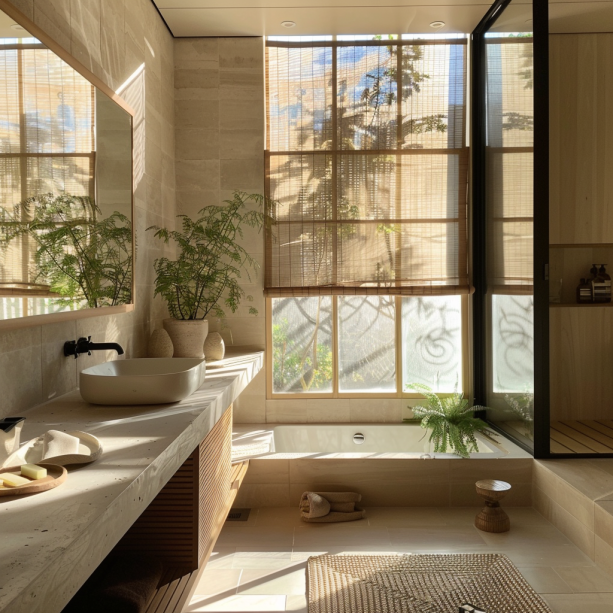
Merging Indoor and Outdoor Spaces
Smooth transitions between indoor and outdoor space are a feature of Scandinavian and Japanese design, and here are some tips to help you achieve it:
- Access Points: Sliding glass doors or large windows that open onto outside space help to visually connect with the outside.
- Plane integration: If you don’t have access to real outdoor space, bring nature indoors with indoor plants, such as a bonsai plant or bamboo.
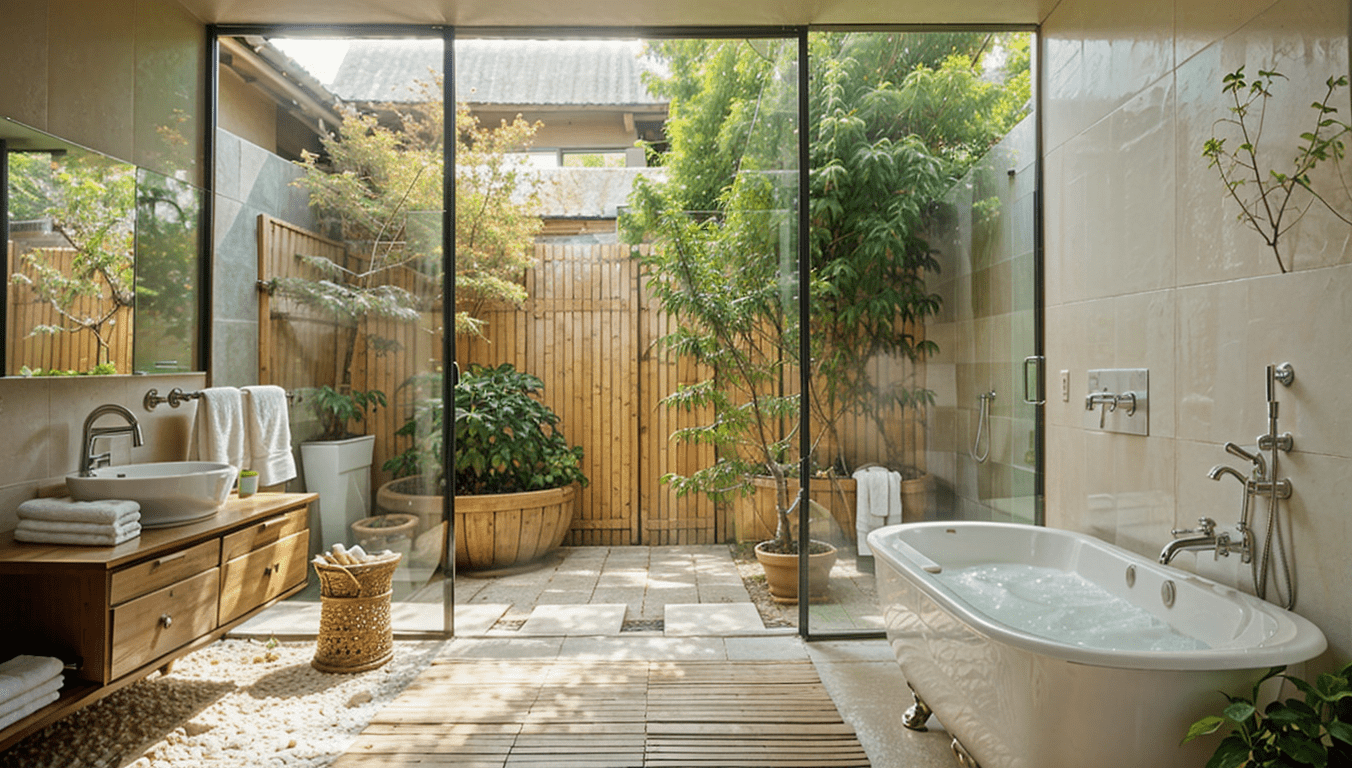
Decorative Elements
While Japandi emphasizes minimalism, accents and decor can add character:
- Suggestive Patterns: Use suggestive patterns through textiles or a feature wallpaper to enliven the space.
- Natural Materials: Natural fibres such as bamboo, rattan and linen can be used in decor items to reinforce the connection with nature.
- Plants: A few well-placed plants can enliven a Japandi space without overwhelming it.
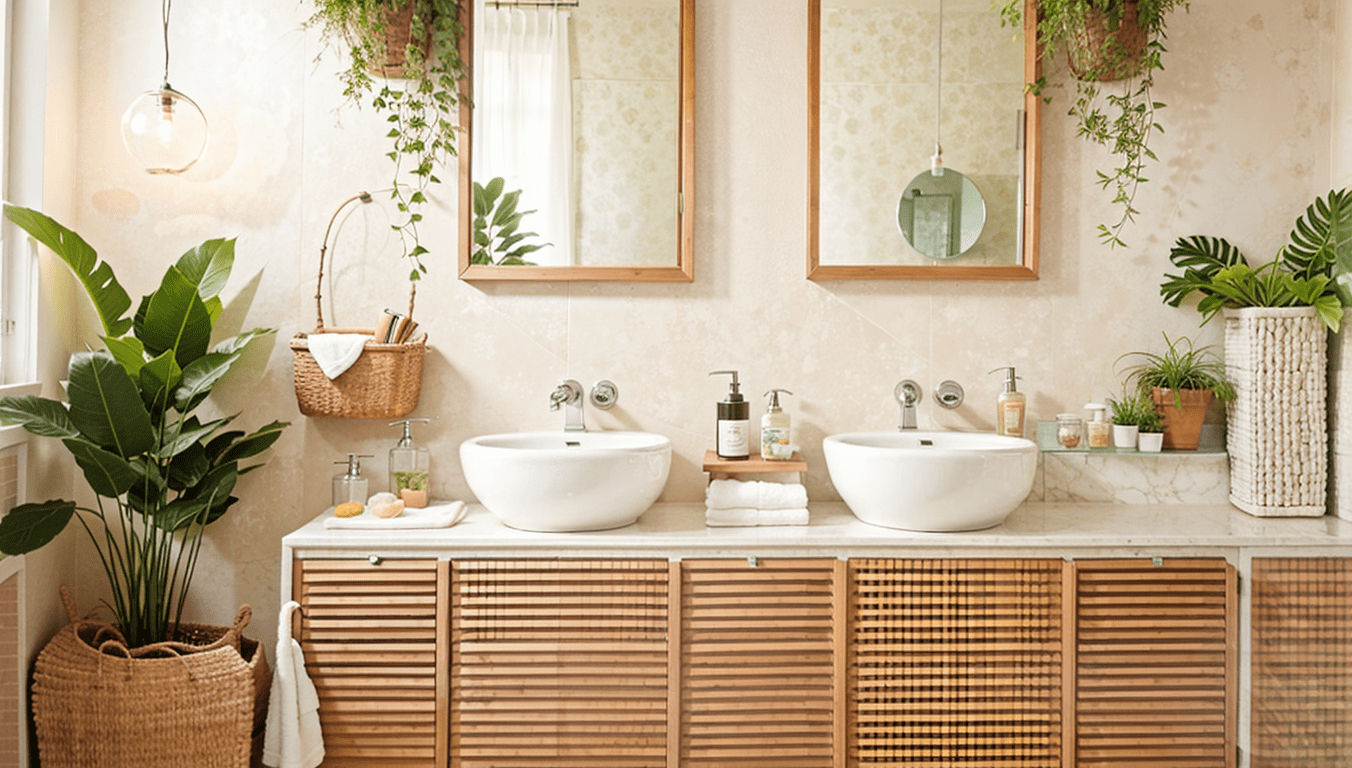
Practical Tips for Embracing Japandi
- Declutter: Focus on decluttering, following the minimalist aspect of Japandi, having only those items that are meaningful and useful.
- Quality Over Quantity: Invest in fewer, high-quality pieces that celebrate imperfection and craftsmanship.
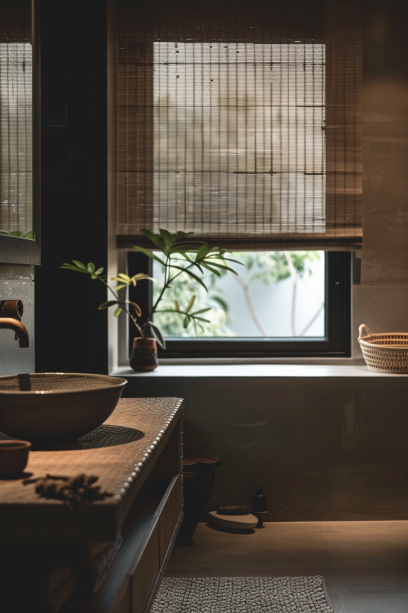
Where to Shop for Japandi Pieces
To truly experience Japandi, look for goods produced and sold in stores that specialised in Scandinavian or Japanese design:
- Artek, MUJI, and BoConcept: For furniture and decor that align with Japandi aesthetics.
-
Etsy and thrift stores: the place to look for one-of-a-kind handmade pieces to add interest to your Japandi space.
Conclusion
Japandi bathrooms feature a sleek and minimalist approach to design that appeals to a minimalist aesthetic yet keeps rooms warm and welcoming.
If you’re facing a revamp of your bathroom, whether large or small, it’s easy to incorporate Japandi design into your scheme to completely transform an ordinary bathroom into a calm and comfortable haven.
Bring some of these ideas to your next home project and appreciate the simplicity and beauty that Japandi style offers.

